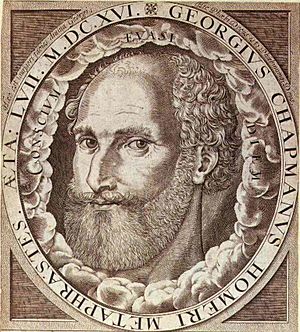George Chapman facts for kids
Quick facts for kids
George Chapman
|
|
|---|---|

George Chapman. Frontispiece engraving for The Whole Works of Homer (1616) attributed to William Hole
|
|
| Born | c. 1559 Hitchin, Hertfordshire, England |
| Died | 12 May 1634 London |
| Occupation | Writer |
| Period | Elizabethan |
| Genre | Tragedy, translation |
| Notable works | Bussy D'Ambois, translations of Homer |
George Chapman (born around 1559 in Hitchin, Hertfordshire – died May 12, 1634, in London) was an important English dramatist, translator, and poet. He was a very smart scholar of ancient Greek and Roman works. His writings often showed ideas from Stoicism, a philosophy about staying calm and strong.
Chapman is most famous for translating the ancient Greek poems Iliad and Odyssey by Homer into English. Some people even think he might have been the "Rival Poet" mentioned in Shakespeare's famous sonnets.
Contents
Life Story
George Chapman was born in Hitchin, a town in Hertfordshire, England. We don't know much about his early life. Some people think he studied at Oxford University, but there's no clear proof.
Chapman faced money problems throughout his life. He often struggled with debt. He tried to find wealthy people to support his work, but many of his supporters, like the Earl of Essex and Prince Henry, died young. The Earl of Essex was executed in 1601, and Prince Henry died in 1612.
Despite these difficulties, Chapman was highly respected by other writers of his time. He spent some time abroad in the early 1590s. He even fought in wars in the Low Countries alongside a famous English general, Sir Francis Vere.
Chapman died in London and was buried at St Giles in the Fields church. A special monument designed by the famous architect Inigo Jones marks his grave inside the church.
Plays for the Stage
By the late 1590s, Chapman became a successful writer of plays. He wrote for different theater groups.
Funny Plays (Comedies)
Chapman wrote several comedies. These include The Blind Beggar of Alexandria (1596) and An Humorous Day's Mirth (1597). His plays were often experimental. For example, An Humorous Day's Mirth helped start a new style of comedy. This style focused on characters with strong, funny personalities.
He also worked with other famous playwrights. One well-known play he wrote with Ben Jonson and John Marston was Eastward Ho (1605). This play made fun of some Scottish people who came to England with the new king, King James I. Because of this, Chapman and Jonson were briefly put in jail!
Serious Plays (Tragedies)
Chapman's most famous serious plays were based on recent French history. These include Bussy D'Ambois (1607) and The Conspiracy and Tragedy of Charles, Duke of Byron (1608). The Byron plays caused some trouble and were even banned from the stage for a while.
His only play based on ancient Roman history was Caesar and Pompey (written 1604).
Other Stage Works
Chapman also wrote a very successful masque called The Memorable Masque of the Middle Temple and Lincoln's Inn in 1613. Masques were special performances with music, dancing, and elaborate costumes, often for royalty.
Poet and Translator
Besides plays, Chapman wrote many poems. One of his poems, De Guiana, Carmen Epicum (1596), was about the adventures of Sir Walter Raleigh. He also finished Christopher Marlowe's poem Hero and Leander (1598).
Chapman's most important work was his translation of Homer's epic poems. He started publishing parts of the Iliad in 1598. In 1616, he released the complete Iliad and Odyssey together. This was the first full English translation of Homer's works!
His translations were very popular for a long time. They were how most English speakers first read these ancient stories. The famous poet John Keats loved Chapman's Homer translations. Keats even wrote a poem about them called "On First Looking into Chapman's Homer."
Chapman also translated other ancient Greek and Roman works. These included the Homeric Hymns and parts of Virgil's Georgics.
Honoring Chapman
Many famous writers have admired George Chapman's work.
The poet Percy Bysshe Shelley included a quote from Chapman's play in his poem The Revolt of Islam. This was a way to show his respect for Chapman.
The Irish playwright Oscar Wilde also used the same quote in one of his writings.
As mentioned, John Keats wrote his famous poem "On First Looking into Chapman's Homer" in 1816. This poem celebrates the excitement of discovering Chapman's amazing translations of Homer.
Famous Words
Here are some lines from Chapman's play All Fools:
I could have written as good prose and verse
As the most beggarly poet of 'em all,
Either Accrostique, Exordion,
Epithalamions, Satyres, Epigrams,
Sonnets in Doozens, or your Quatorzanies,
In any rhyme, Masculine, Feminine,
Or Sdrucciola, or cooplets, Blancke Verse:
Y'are but bench-whistlers now a dayes to them
That were in our times....
Images for kids
-
Grave marker of George Chapman inside the church of St Giles in the Fields, London. The memorial was designed by Inigo Jones.
See also
 In Spanish: George Chapman para niños
In Spanish: George Chapman para niños
- Rival Poet
- The School of Night
- Thomas Marc Parrott
- Louis de Bussy d'Amboise
- Charles de Gontaut, duc de Biron
 | Bayard Rustin |
 | Jeannette Carter |
 | Jeremiah A. Brown |


